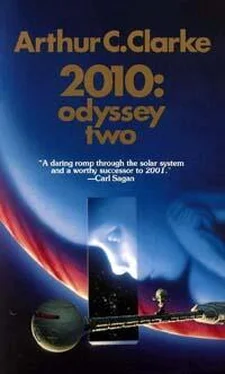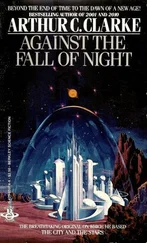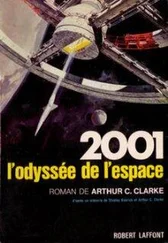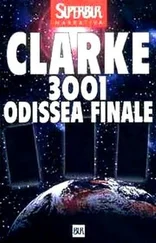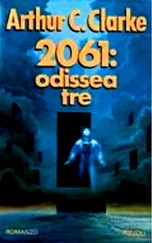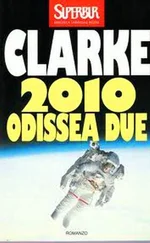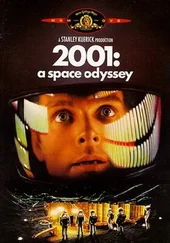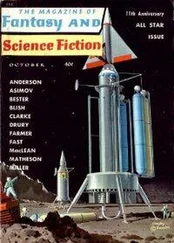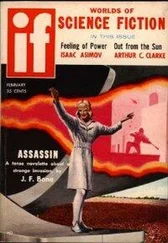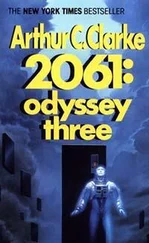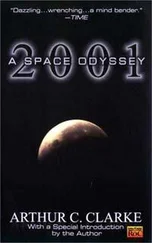Arthur Clarke - 2010 - Odyssey Two
Здесь есть возможность читать онлайн «Arthur Clarke - 2010 - Odyssey Two» весь текст электронной книги совершенно бесплатно (целиком полную версию без сокращений). В некоторых случаях можно слушать аудио, скачать через торрент в формате fb2 и присутствует краткое содержание. Жанр: Фантастика и фэнтези, на английском языке. Описание произведения, (предисловие) а так же отзывы посетителей доступны на портале библиотеки ЛибКат.
- Название:2010: Odyssey Two
- Автор:
- Жанр:
- Год:неизвестен
- ISBN:нет данных
- Рейтинг книги:4 / 5. Голосов: 1
-
Избранное:Добавить в избранное
- Отзывы:
-
Ваша оценка:
- 80
- 1
- 2
- 3
- 4
- 5
2010: Odyssey Two: краткое содержание, описание и аннотация
Предлагаем к чтению аннотацию, описание, краткое содержание или предисловие (зависит от того, что написал сам автор книги «2010: Odyssey Two»). Если вы не нашли необходимую информацию о книге — напишите в комментариях, мы постараемся отыскать её.
2010: Odyssey Two — читать онлайн бесплатно полную книгу (весь текст) целиком
Ниже представлен текст книги, разбитый по страницам. Система сохранения места последней прочитанной страницы, позволяет с удобством читать онлайн бесплатно книгу «2010: Odyssey Two», без необходимости каждый раз заново искать на чём Вы остановились. Поставьте закладку, и сможете в любой момент перейти на страницу, на которой закончили чтение.
Интервал:
Закладка:
At Max's knock, a green light flashed on, and Floyd drifted inside as gracefully as he could. Though he had spoken to Captain Orlova many times, they had never before met. So he had two surprises.
It was impossible to judge a person's real size over the viewphone; the camera somehow converted everyone to the same scale. Captain Orlova, standing – as well as one could stand in zero gravity – barely reached to Floyd's shoulders. The viewphone had also completely failed to convey the penetrating quality of those dazzling blue eyes, much the most striking feature of a face that, at the moment, could not be fairly judged for beauty.
'Hello, Tanya,' said Floyd. 'How nice to meet at last. But what a pity about your hair.'
They grasped both hands, like old friends.
'And nice to have you aboard, Heywood!' answered the captain. Her English, unlike Brailovsky's, was quite fluent, though heavily accented. 'Yes, I was sorry to lose it – but hair's a nuisance on long missions, and I like to keep the local barbers away as long as possible. And my apologies about your cabin; as Max will have explained, we suddenly found we needed another ten cubic metres of storage space. Vasili and I won't be spending much time here for the next few hours – please feel free to use our quarters.'
'Thank you. What about Curnow and Chandra?'
'I've made similar arrangements with the crew. It may seem as if we're treating you like cargo -'
'Not wanted on voyage.'
'Pardon?'
'That's a label they used to put on the baggage, in the old days of ocean travel.'
Tanya smiled. 'It does look rather that way. But you'll be wanted all right, at the end of the trip. We're already planning your revival party.'
'That sounds too religious. Make it – no, resurrection would be even worse! – waking-up party. But I can see how busy you are – let me dump my things and continue my grand tour.'
'Max will show you around – take Dr Floyd to Vasili, will you? He's down in the drive unit.'
As they drifted out of the captain's quarters, Floyd gave mental good marks to the crew-selection committee. Tanya Orlova was impressive enough on paper; in the flesh she was almost intimidating, despite her charm. I wonder what she's like, Floyd asked himself, when she loses her temper. Would it be fire or ice? On the whole, I'd prefer not to find out.
Floyd was rapidly acquiring his space legs; by the time they reached Vasili Orlov, he was manoeuvring almost as confidently as his guide. The chief scientist greeted Floyd as warmly as his wife had.
'Welcome aboard, Heywood. How do you feel?'
'Fine, apart from slowly starving to death.'
For a moment Orlov looked puzzled; then his face split into a broad smile,
'Oh, I'd forgotten. Well, it won't be for long. In ten months' time, you can eat as much as you like.'
Hibernators went on a low-residue diet a week in advance; for the last twenty-four hours, they took nothing but liquid. Floyd was beginning to wonder how much of his increasing light-headedness was due to starvation, how much to Curnow's champagne, and how much to zero gravity.
To concentrate his mind, he scanned the multicoloured mass of plumbing that surrounded them.
'So this is the famous Sakharov Drive. It's the first time I've seen a full-scale unit.'
'It's only the fourth one ever built.'
'I hope it works.'
'It had better. Otherwise, the Gorky City Council will be renaming Sakharov Square again.'
It was a sign of the times that a Russian could joke, however wryly, about his country's treatment of its greatest scientist. Floyd was again reminded of Sakharov's eloquent speech to the Academy, when he was belatedly made Hero of the Soviet Union. Prison and banishment, he had told his listeners, were splendid aids to creativity; not a few masterpieces had been born within the walls of cells, beyond the reach of the world's distractions. For that matter, the greatest single achievement of the human intellect, the Principia itself, was a product of Newton's self-imposed exile from plague-ridden London.
The comparison was not immodest; from those years in Gorky had come not only new insights into the structure of matter and the origin of the Universe, but the plasma-controlling concepts that had led to practical thermonuclear power. The drive itself, though the best-known and most publicized outcome of that work, was merely one byproduct of that astonishing intellectual outburst. The tragedy was that such advances had been triggered by injustice; one day, perhaps, humanity would find more civilized ways of managing its affairs.
By the time they had left the chamber, Floyd had learned more about the Sakharov Drive than he really wished to know, or expected to remember. He was well acquainted with its basic principles – the use of a pulsed thermonuclear reaction to heat and expel virtually any propellant material. The best results were obtained with pure hydrogen as a working fluid, but that was excessively bulky and difficult to store over long periods of time. Methane and ammonia were acceptable alternatives; even water could be used, though with considerably poorer efficiency.
Leonov would compromise; the enormous liquid hydrogen tanks that provided the initial impetus would be discarded when the ship had attained the necessary speed to carry it to Jupiter. At the destination, ammonia would be used for the braking and rendezvous manoeuvres, and the eventual return to Earth.
That was the theory, checked and rechecked in endless tests and computer simulations. But as the ill-fated Discovery had shown so well, all human plans were subject to ruthless revision by Nature, or Fate, or whatever one preferred to call the powers behind the Universe.
'So there you are, Dr Floyd,' said an authoritative female voice, interrupting Vasili's enthusiastic explanation of magnetohydrodynamic feedback, 'Why didn't you report to me?'
Floyd rotated slowly on his axis by gently torquing himself with one hand. He saw a massive, maternal figure wearing a curious uniform adorned with dozens of pockets and pouches; the effect was not unlike that of a Cossack trooper draped with cartridge belts.
'Nice to meet you again, Doctor. I'm still exploring – I hope you've received my medical report from Houston.'
'Those vets at Teague! I wouldn't trust them to recognize foot-and-mouth disease!'
Floyd knew perfectly well the mutual respect felt between Katerina Rudenko and the Olin Teague Medical Center, even if the doctor's broad grin had not discounted her words. She saw his look of frank curiosity, and proudly fingered the webbing around her ample waist.
'The conventional little black bag isn't very practical in zero gravity – things float out of it and aren't there when you need them. I designed this myself, it's a complete minisurgery. With this, I could remove an appendix – or deliver a baby.'
'I trust that particular problem won't arise here.'
'Ha! A good doctor has to be ready for everything.'
What a contrast, thought Floyd, between Captain Orlova and Dr – or should he call her by her correct rank of Surgeon-Commander? – Rudenko. The captain had the grace and intensity of a prima ballerina; the doctor might have been the prototype of Mother Russia – stocky build, flat peasant face, needing only a shawl to complete the picture. Don't let that fool you, Floyd told himself. This is the woman who saved at least a dozen lives during the Komarov docking accident – and, in her spare time, manages to edit the Annals of Space Medicine. Consider yourself very lucky to have her aboard.
'Now, Dr Floyd, you're going to have plenty of time later to explore our little ship. My colleagues are too polite to say this, but they've work to do and you're in the way. I'd like to get you – all three of you – nice and peaceful as quickly as we can. Then we'll have less to worry about.'
Читать дальшеИнтервал:
Закладка:
Похожие книги на «2010: Odyssey Two»
Представляем Вашему вниманию похожие книги на «2010: Odyssey Two» списком для выбора. Мы отобрали схожую по названию и смыслу литературу в надежде предоставить читателям больше вариантов отыскать новые, интересные, ещё непрочитанные произведения.
Обсуждение, отзывы о книге «2010: Odyssey Two» и просто собственные мнения читателей. Оставьте ваши комментарии, напишите, что Вы думаете о произведении, его смысле или главных героях. Укажите что конкретно понравилось, а что нет, и почему Вы так считаете.
